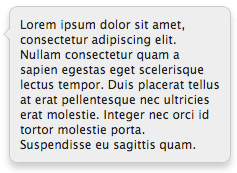PHP and Echo
As any beginner PHP could tell you, the echo function outputs data to the screen (or command line depending on how you're using PHP). Some, however, may not know that PHP's "echo()" isn't really a function at all. From PHP.net:
"echo() is not actually a function (it is a language construct), so you are not required to use parentheses with it. echo() (unlike some other language constructs) does not behave like a function, so it cannot always be used in the context of a function. Additionally, if you want to pass more than one parameter to echo(), the parameters must not be enclosed within parentheses."
So, instead of traditionally coding this...
echo("The MD5 of $text is: ".md5($text)."!");
...you can actually do this...
echo "The MD5 of $text is: ",md5($text),'!';
In fact, separating strings with commas is faster than concatenation! With a name like echo, it should be a bit crazy, right?
![Introducing MooTools Templated]()
One major problem with creating UI components with the MooTools JavaScript framework is that there isn't a great way of allowing customization of template and ease of node creation. As of today, there are two ways of creating:
new Element Madness
The first way to create UI-driven...
![Welcome to My New Office]()
My first professional web development was at a small print shop where I sat in a windowless cubical all day. I suffered that boxed in environment for almost five years before I was able to find a remote job where I worked from home. The first...
![CSS Tooltips]()
We all know that you can make shapes with CSS and a single HTML element, as I've covered in my CSS Triangles and CSS Circles posts. Triangles and circles are fairly simply though, so as CSS advances, we need to stretch the boundaries...
![dwImageProtector Plugin for jQuery]()
I've always been curious about the jQuery JavaScript library. jQuery has captured the hearts of web designers and developers everywhere and I've always wondered why. I've been told it's easy, which is probably why designers were so quick to adopt it NOT that designers...





Whoa the comma thing is a mindfreak. That saves some concatenated html output hell.
“In fact, separating strings with commas is faster than concatenation!”
I’m not sure what you mean by this? How is it faster?
I don’t think I have ever used parentheses with the echo. It’s weird to me to see it done like that.
@deef: It’s faster because PHP doesn’t need to continuously concatenate string upon string — commas allow for “Boom! Boom! Boom! Boom!” instead of “……….BOOM!”.
@mark: I was high-horse about it for a while. To me it was a function so “echo()” was “best form.” Foolish, I was.
I ran a quick test to see if I would notice some speed differences using the commas, noticed about 10% output speed increase in the test script. Funny… didn’t kow about it. Thank you!
Well, I always use echo; I didn’t actually know you could do echo(), but no matter. Not a function? Strange.
I read about the comma versus dot thing on an optimization post. According to this guy’s tests is was nowhere near 10%, but commas were still faster nonetheless.
http://making-the-web.com/2007/08/24/tips-for-faster-php-scripts/
I always hated the concatenation! but didnt know that commas do it faster.
Thanks
Find an interesting PHP-Benchmark.
Somewhere down the page, there is also an echo-Benchmark.
Seems like commas are not allways faster.
http://www.phpbench.com/
Find => Found
allways => always
It was to early in the morning, sorry! :-)
http://www.phpbench.com/
The author only compares echo with commas/periods using either all string or all variable. I’d be interested in seeing a comparison using some combination of both variables and commas.. something like
$a = ‘bbbbbb’;
echo ‘aaaaaa’,$b,’aaaaaa’,$b;
vs
echo ‘aaaaaa’.$b.’aaaaaa’.$b;